South Dakota Documents
Quitclaim Deed
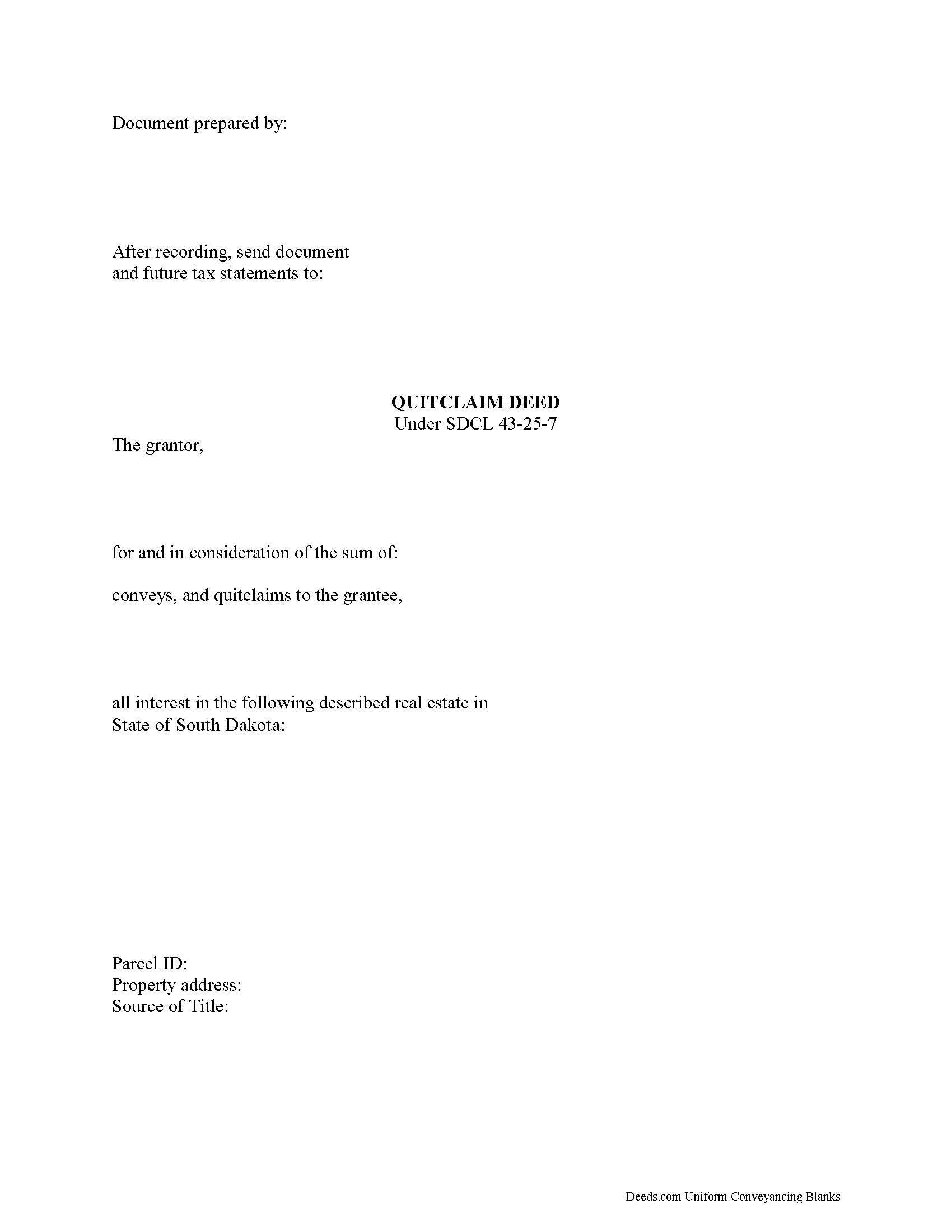
The form of a quitclaim deed in South Dakota (South Dakota Codified Laws, 43-25-7) requires, among other items, the grantor's signature and an acknowledgment of that signature. The mailing address of the grantee to the quitclaim deed and a legal description of the property being conveyed are both required at the time of recording (43-28-21). A quitclaim deed presented to a county recorder in South Dakota must be accompanied by a Certificate of Value.
Any person holding real estate under the terms of a quitclaim deed as defined in 43-25-11 will be deemed a purchaser in good faith and for a valuable consideration, unless the person had, at the time of execution and delivery of such conveyance, actual notice or knowledge of a prior unrecorded conveyance affecting title to such real property.
An unrecorded quitclaim deed in South Dakota is valid between the parties named in the instrument and those who have notice of it (43-28-14). In order to provide constructive notice to all purchasers or encumbrancers of the contents within, recording of the quitclaim deed with the county clerk in the appropriate county is necessary (43-28-15). Every conveyance of real property is void again... More Information about the South Dakota Quitclaim Deed
Gift Deed
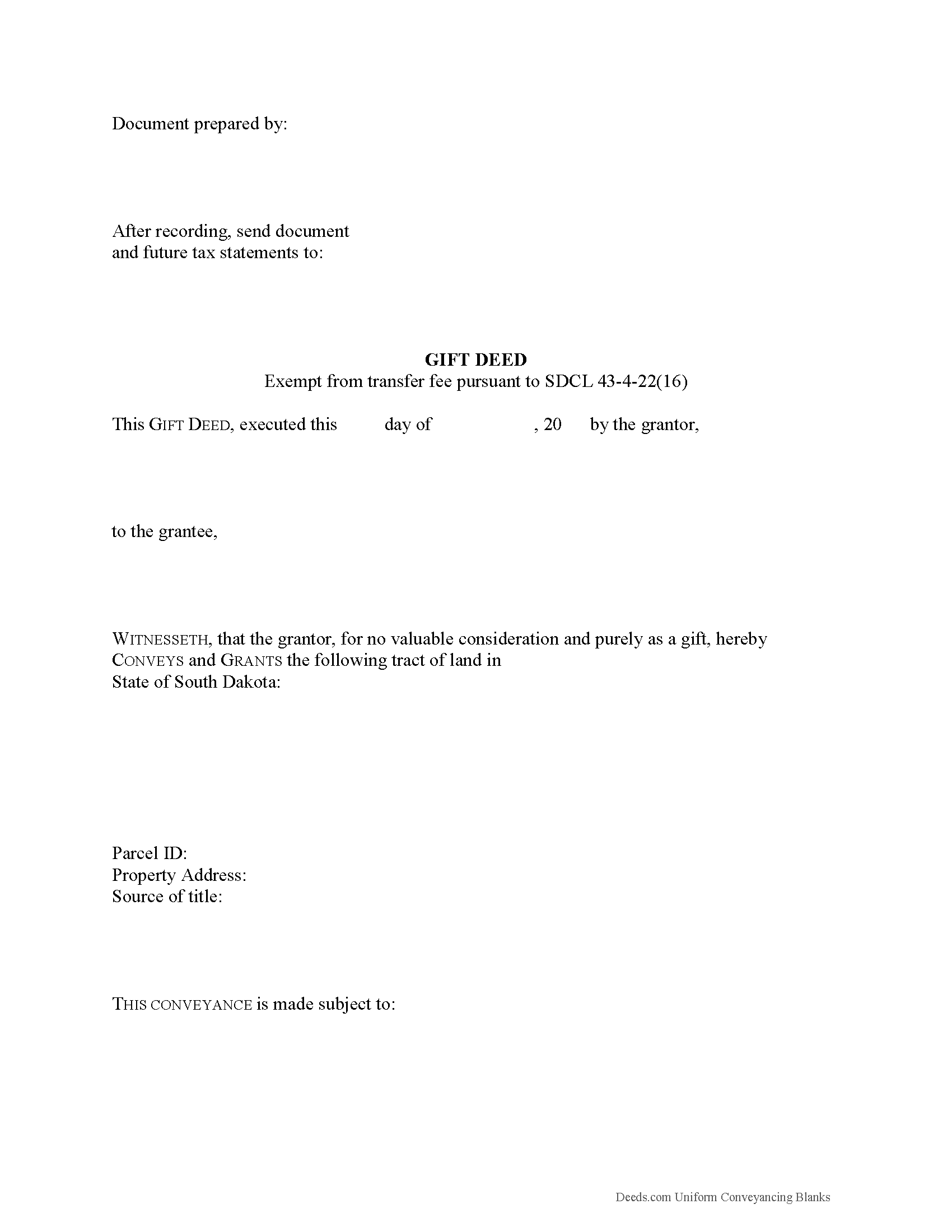
Gifts of Real Property in South Dakota
A gift deed, or deed of gift, is a legal document voluntarily transferring title to real property from one party (the grantor or donor) to another (the grantee or donee). A gift deed typically transfers real property between family or close friends. Gift deeds are also used to donate to a non-profit organization or charity. The deed serves as proof that the transfer is indeed a gift and without consideration (any conditions or form of compensation).
Valid deeds must meet the following requirements: The grantor must intend to make a present gift of the property, the grantor must deliver the property to the grantee, and the grantee must accept the gift. A gift deed must contain language that explicitly states no consideration is expected or required, because any ambiguity or reference to consideration can make the deed contestable in court. A promise to transfer ownership in the future is not a gift, and any deed that does not immediately transfer the interest in the property, or meet any of the aforementioned requirements, can be revoked [1].
A lawful gift deed includes the grantor's full name and marital status, as well as the grante... More Information about the South Dakota Gift Deed
Warranty Deed
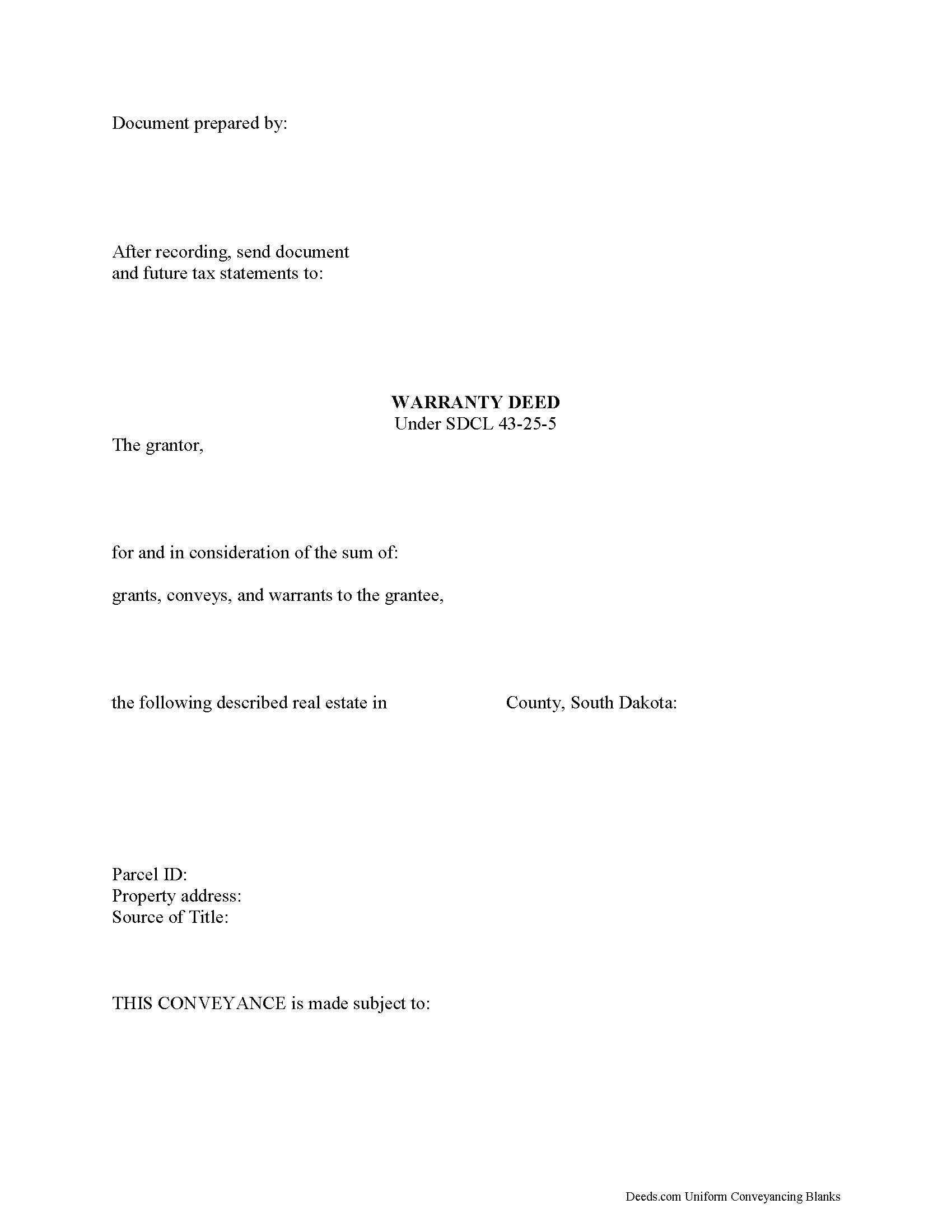
Real or immovable property in South Dakota consists of land, that which is affixed to land, that which is incidental or appurtenant to land, and that which is immovable by law (43-1-3). A transfer of real property is required to be in writing and signed by the grantor or by his agent authorized in writing. A warranty deed is one such deed that can be used to transfer real property in South Dakota. The statutory form for a warranty deed is presented in 43-25-5 of the South Dakota Codified Laws. A warranty deed implies the following covenants on the part of the grantor: (1) That he is lawfully seized of the premises in fee simple and has good right to convey the same, (2) that the premises are free from all encumbrances, (3) that he warrants to the grantee, his heirs, and assigns the quiet and peaceable possession thereof, and (4) that he will defend the title thereto against all persons who may lawfully claim the same (43-25-6).
The execution of a warranty deed must be duly acknowledged to entitle it to be recorded. If the deed is not acknowledged, it must be proved by a subscribing witness (43-25-26). The proof or acknowledgment of a warranty deed can be made at any place with... More Information about the South Dakota Warranty Deed
Special Warranty Deed
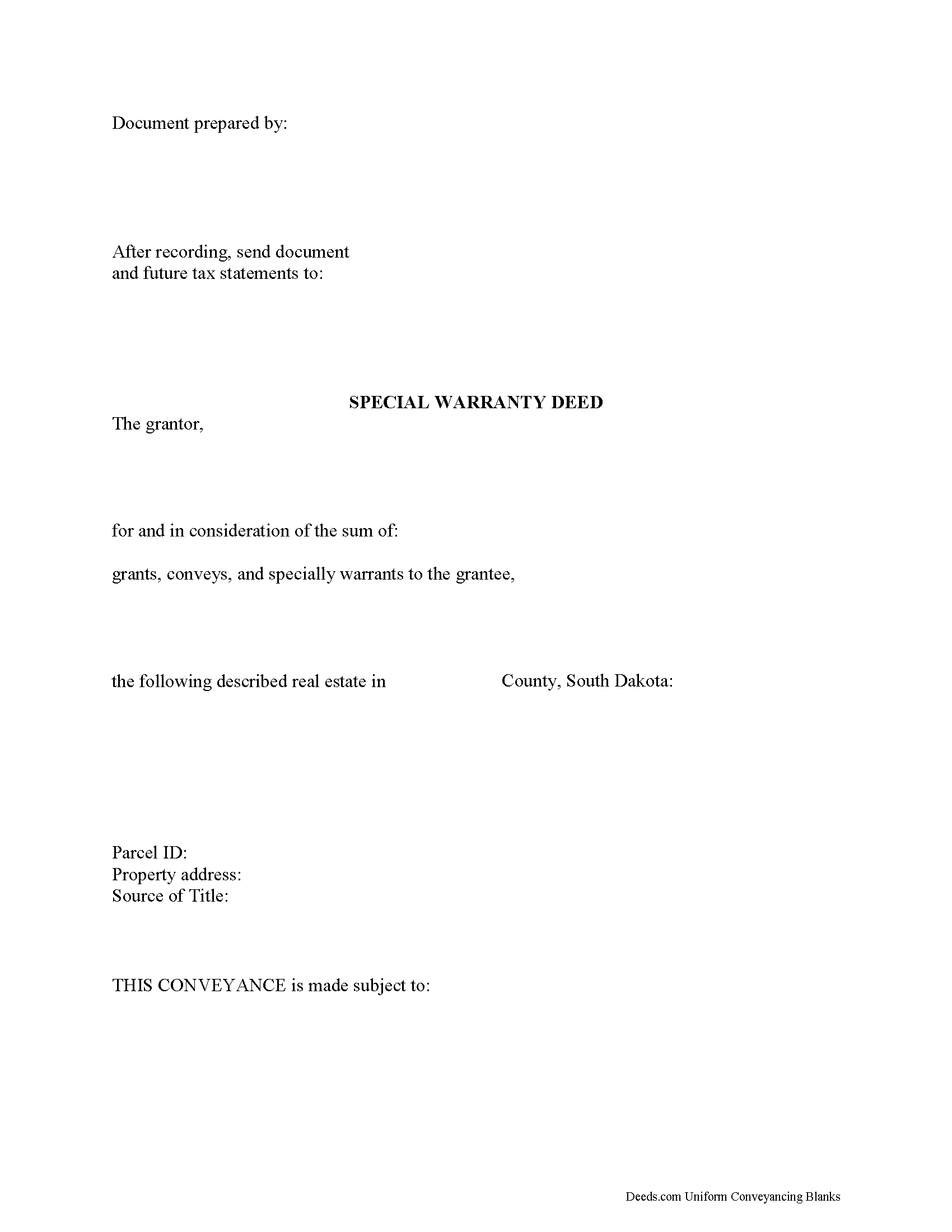
A special warranty deed can be used in South Dakota to transfer title to real estate. This type of deed must satisfy the statutory requirements for a conveyance of real estate.
A special warranty deed is required to be in writing and signed by the grantor or by his agent authorized in writing South Dakota Codified Laws do not provide a specific statutory form for a special warranty deed. In a special warranty deed, the grantor warrants to defend the title against only the claims and demands of the grantor and those claiming by, through, or under him.
The execution of a special warranty deed must be duly acknowledged to entitle it to be recorded. If the deed is not acknowledged, it must be proved by a subscribing witness (43-25-26). The proof or acknowledgment of a special warranty deed can be made at any place within the state before a notary public or justice or clerk of the Supreme Court (18-4-1). Additional officers who are authorized to take the proof or acknowledgment of a deed in South Dakota within their own circuit, county, or municipality are listed in section 18-4-2 of the South Dakota Codified Laws. Special warranty deeds can also be acknowledged out of state in... More Information about the South Dakota Special Warranty Deed
Grant Deed
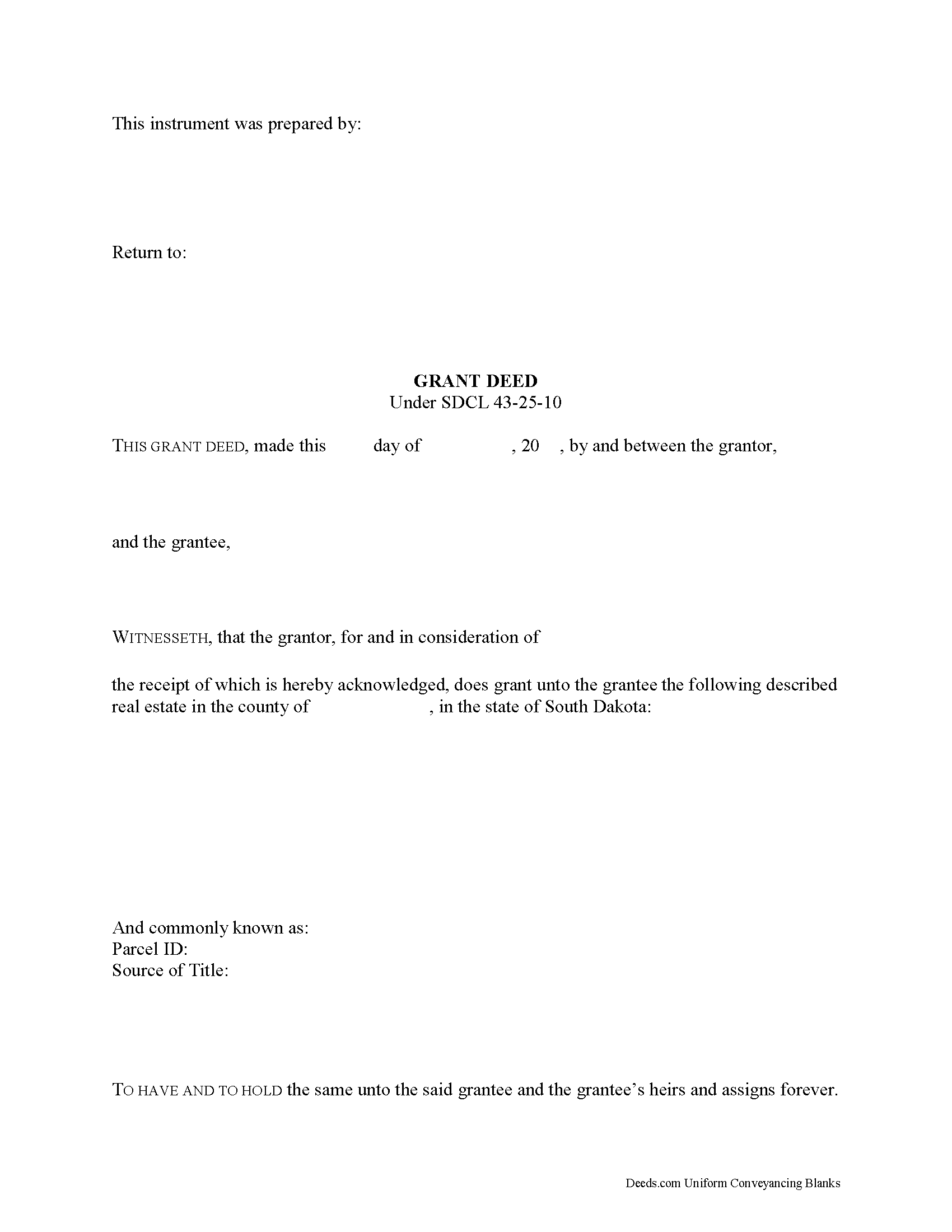
In South Dakota, title to real property can be transferred from one party to another by executing a grant deed. Use a grant deed to transfer title with the implied covenants that guarantee that the title is free of any encumbrances (except for those stated in the deed) and that the grantor holds an interest in the property and is free to convey it (43-25-10). The word "grant" in the conveyancing clause transfers fee simple title (SDCL 43-25-10).
Grant deeds offer the grantee (buyer) more protection than quitclaim deeds, but less than warranty deeds. A grant deed differs from a quitclaim deed in that the latter offers no warranty of title, and only conveys any interest that the grantor may have in the subject estate. A warranty deed offers more surety than a grant deed because it requires the grantor to defend against claims to the title.
A lawful grant deed includes the grantor's full name, mailing address, and marital status; the consideration given for the transfer; and the grantee's full name, mailing address, marital status, and vesting. Vesting describes how the grantee holds title to the property. Generally, real property is owned in either sole ownership or in co-owne... More Information about the South Dakota Grant Deed
Correction Deed
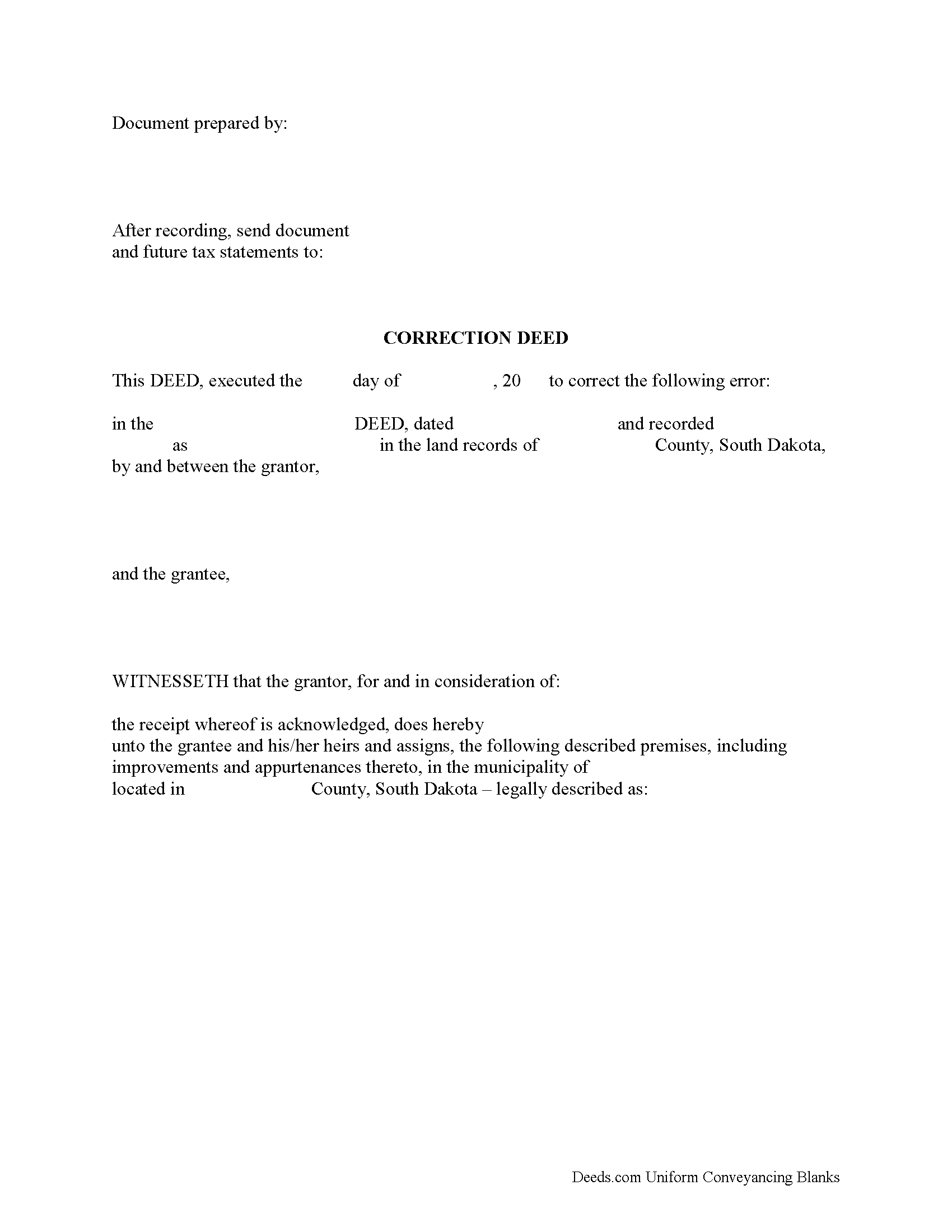
Use the correction deed to correct an error in a previously recorded deed of conveyance in South Dakota.
Correcting an error in a recorded deed helps prevent problems that might arise when the current owner tries to sell the property. The best method for correction is to prepare and record a new document, a so-called correction deed. This document does not convey title; instead, it re-enacts and confirms the prior conveyance of the property.
Apart from supplying the correct information, the new deed must give the reason for correcting, and it must reference the prior deed by title, date, and recording number. The original grantor must sign again, thus confirming the property transfer to the same grantee. Generally, corrective deeds are used to address minor errors in a deed, such as typos, accidentally omitted suffixes or middle initials in names, and other minor omissions. When in doubt about the gravity of an error and whether a correction deed is the appropriate vehicle to address it, consult with a lawyer.
For certain changes, a correction deed may not be appropriate. Adding or removing a grantee, for example, or making material changes to the legal description, espec... More Information about the South Dakota Correction Deed
Easement Deed
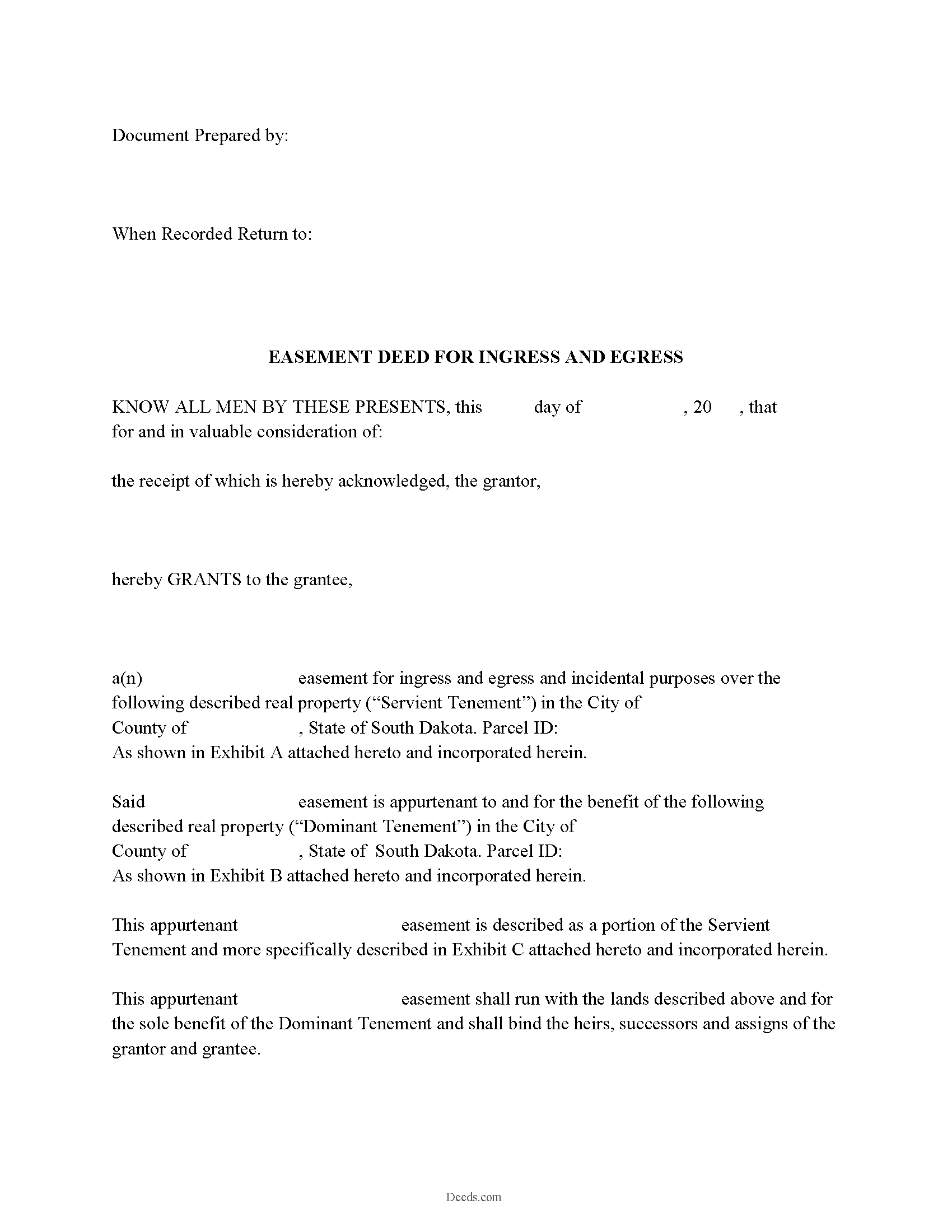
An easement is a land burden or servitude upon land that may be attached to other land as incidents or appurtenances (43-13-2). The land that an easement is attached to is called the dominant estate, while the land upon which a burden or servitude is laid is called the servient tenement (43-13-3). A servitude in South Dakota can be created only by someone who has a vested estate in the servient tenement (43-13-4). The extent of the easement will be determined by the terms of the grant or by the nature of the enjoyment by which it was required (43-13-5). Specific rules apply to the creation of certain easements in South Dakota, such as with wind easements, which can be granted in the same manner and with the same effect as other easements but must contain additional statutorily required information (43-13-17). A transfer of real property in this state will pass all the easements attached to the property (43-25-30).
In order to present an easement deed for recording, it must be signed and acknowledged or proved by the grantor. If the deed is not acknowledged, it can be proved by a subscribing witness (43-25-26). An easement deed can be proved or acknowledged at any place within t... More Information about the South Dakota Easement Deed
Termination of Easement
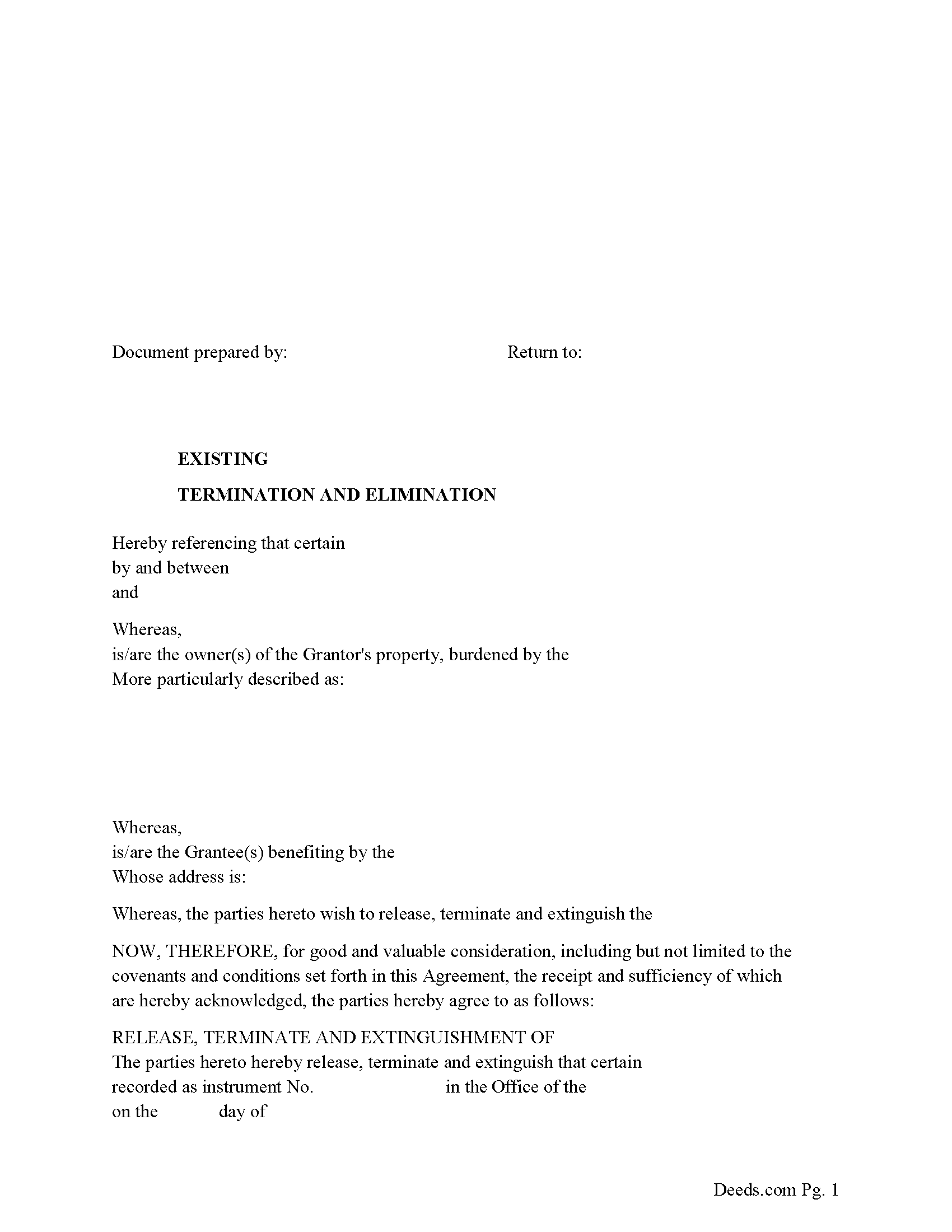
Use this form to release, terminate, extinguish a previously recorded document that involves access to and from a property.
Documents such as:
1. Easement Deeds or Agreements (An easement is a non-possessory interest in land, granting the right to use someone else's property for a specific purpose, like a driveway or utility line)
2. Access Roads
3. Right of Ways
4. Utility Easements (Power, Gas, Water, Sewer, Etc.)
5. Drainage Easements
This document allows the owner of the land, burdened by the access and the party that benefits from the access, to sign an agreement releasing the property from such access, ... More Information about the South Dakota Termination of Easement
Notice of Lis Pendens
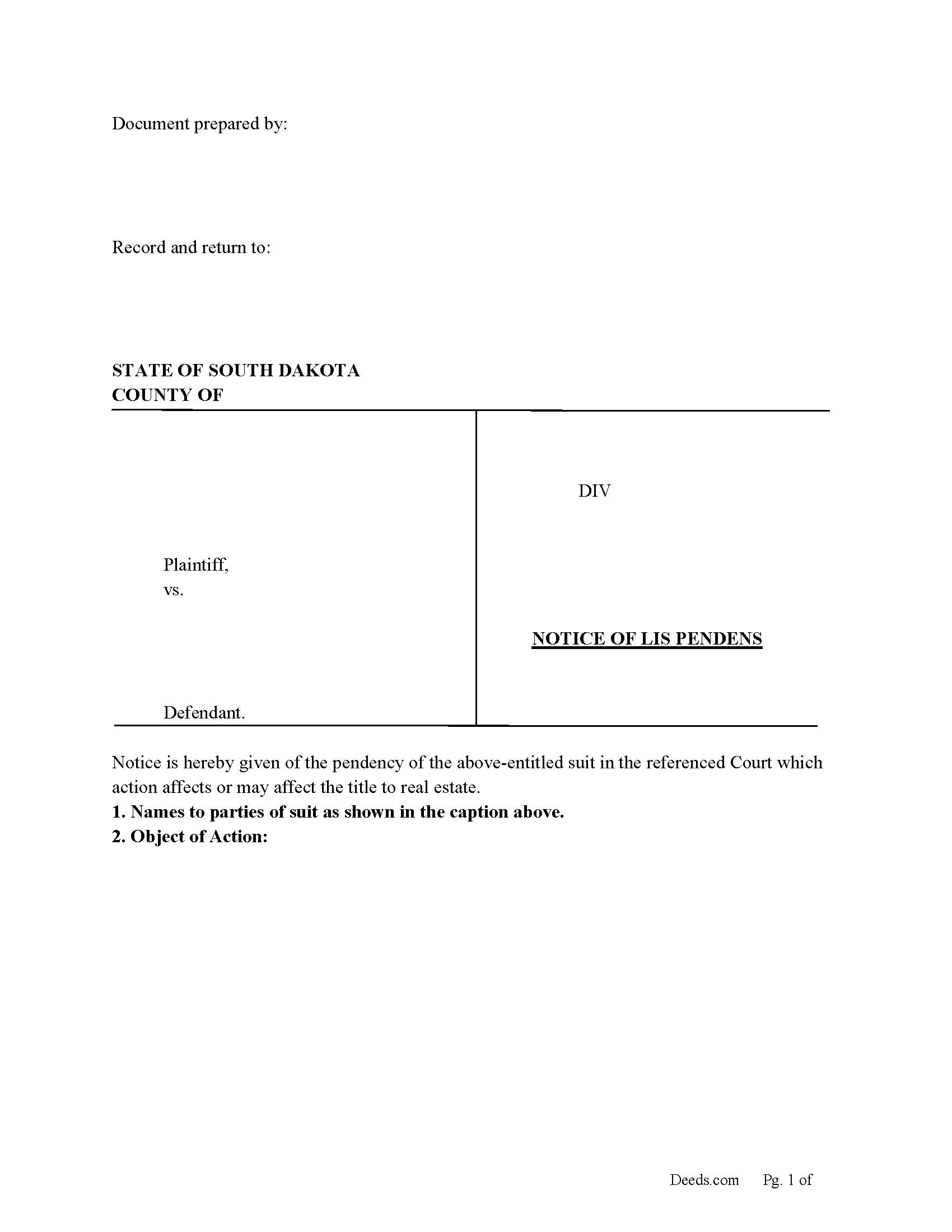
A Notice of Lis Pendens once filed notifies the world of a pending lawsuit affecting real property. (From the time of filing only shall the pendency of the action be constructive notice to a purchaser or encumbrancer of the property affected thereby. Every person whose conveyance or encumbrance is subsequently executed or subsequently recorded shall be deemed a subsequent purchaser or encumbrancer and shall be bound by all proceedings taken after the filing of such notice, to the same extent as if he were a party to the action.) (S.D. Statute 15-10-3. Constructive notice from filing of notice--Subsequent purchasers and encumbrancers bound.)
Chapter 45. Partition And Sale of Real Estate
Statute 21-45-7 Lis pendens notice required--Constructive notice.
21-45-7. Lis pendens notice required--Constructive notice. Immediately after filing the complaint in the circuit court, the plaintiff must record in the office of the register of deeds of the county or of the several counties in which the property is situated, a notice of the pendency of the action, containing the names of the parties, so far as known, the object of the action, and a description of the property to be affected ther... More Information about the South Dakota Notice of Lis Pendens
Certificate of Discharge of Notice of Lis Pendens
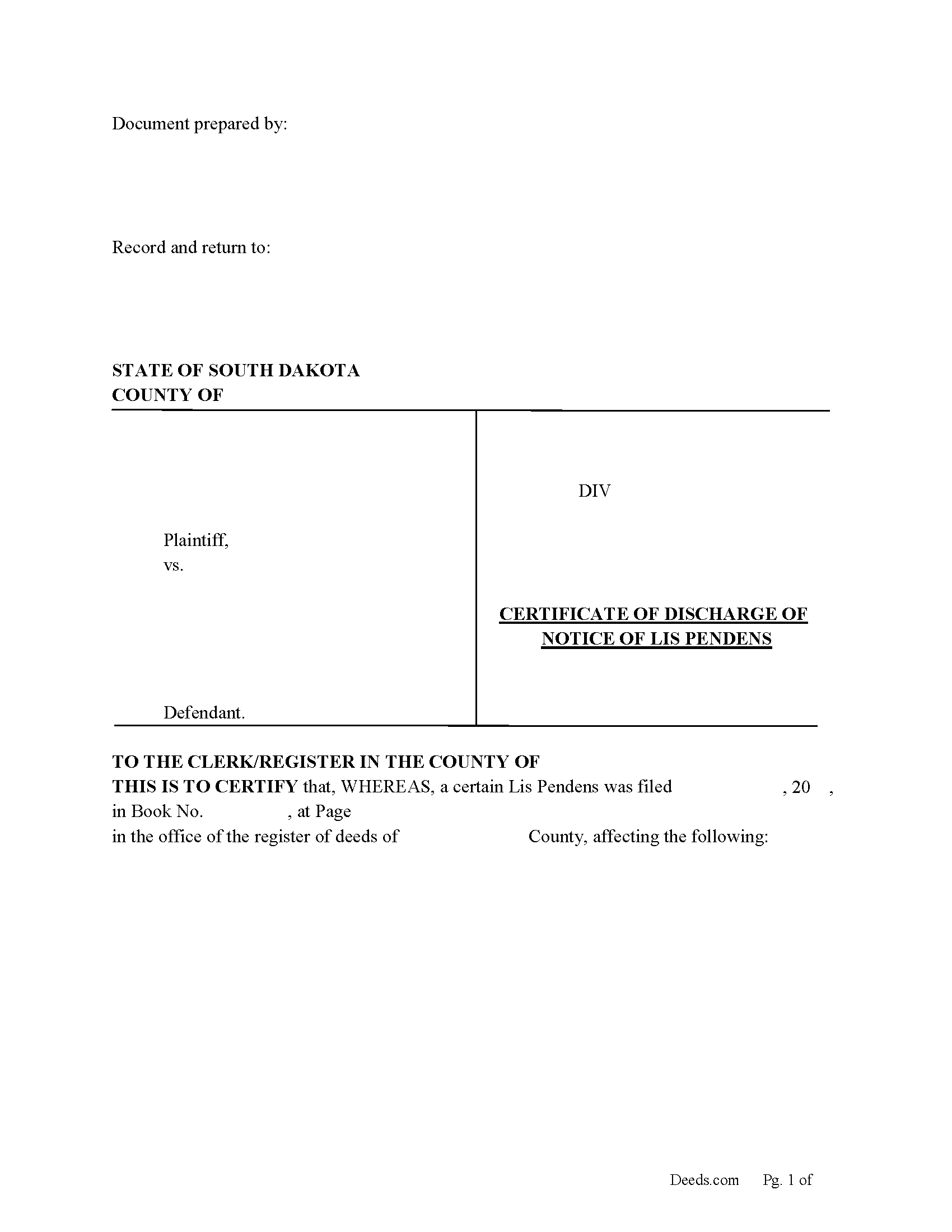
Use this form to Discharge a previously recorded "Notice of Lis Pendens" that was filed in county's registry of deeds office.
15-10-4. Discharge of notice of pendency of action--Contents, acknowledgment and recording.
Whenever notice of the pendency of any action has been filed or recorded in the office of the register of deeds in any county, the party plaintiff or defendant filing the same or at whose instance the same was filed, or his attorney or attorneys, in whose name or names the notice is subscribed, may discharge the same of record by filing with the register of deeds in whose office the notice is filed, a certificate of the discharge of said notice, executed and acknowledged by the same persons as above provided for certificates of discharge thereof. Such certificates of discharge, when filed with the register of deeds shall be acknowledged in the same form as is provided by law for the acknowledgment of conveyances of real estate and may be recorded in like manner.
(South Dakota Discharge of LP Package includes form, guidelines, and completed example) For use in South Dakota only.
... More Information about the South Dakota Certificate of Discharge of Notice of Lis Pendens
Mortgage Security Agreement and Promissory Note
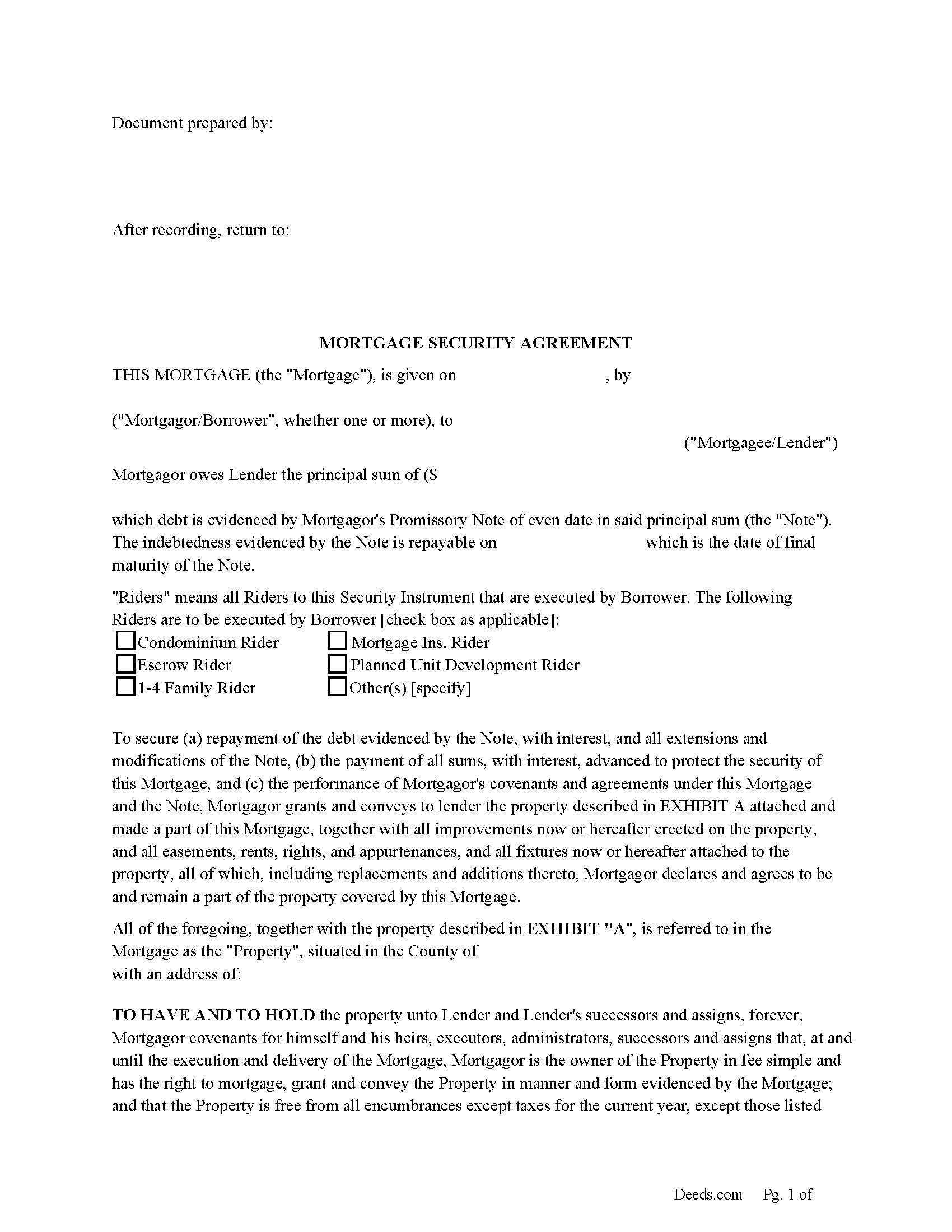
This is a recordable mortgage that serves (as notice to all subsequent purchasers and encumbrancers.) (44-8-10) Included is a Power of Sale clause, considered more favorable to lenders because it uses a non-judicial foreclosure, saving time and expense. [In case of default in the payment of said principal sum of money or any part thereof, or interest thereon at the time or times above specified for payment thereof, or in case of nonpayment of any taxes, assessments, or insurance as aforesaid, or of breach of any covenant or agreement herein contained, then and in either case, the whole, principal and interest, of said note -- shall at the option of the holder thereof, immediately become due and payable, and this mortgage may be foreclosed by action, or by advertisement as provided by statute or the rules of practice relating thereto, and this paragraph shall be deemed as authorizing and constituting a power of sale as mentioned in said statutes or rules, and any amendatory thereof.] [44-8-3]
This mortgage contains a (due-on-sale clause) which (is a provision of a real estate mortgage which requires that the note secured by the mortgage be paid at the time the property is transfe... More Information about the South Dakota Mortgage Security Agreement and Promissory Note
Satisfaction of Mortgage
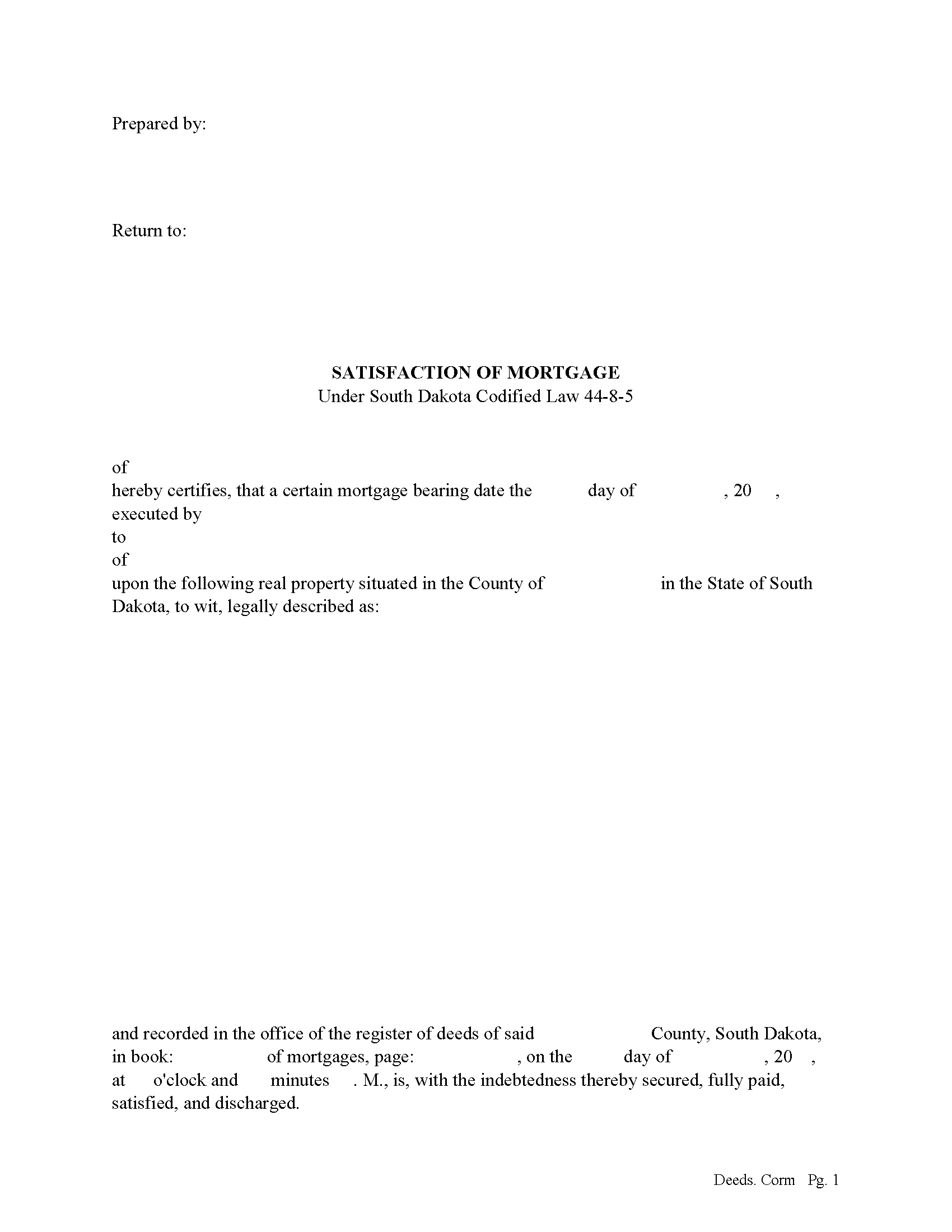
Use this form to satisfy/discharge a mortgage, typically when it is paid in full.
SOUTH DAKOTA CHAPTER 44-8
REAL ESTATE MORTGAGES
44-8-5. Satisfaction of real estate mortgage--Standard form.
SATISFACTION OF MORTGAGE
________ of ________ state of ________, hereby certifies, that a certain mortgage bearing date the ________ day of ________, 20__, executed by ________ to ________ of ________ upon the following real property situated in the county of ________ in the State of South Dakota, to wit, the _________________________________________
and recorded in the office of the register of deeds of said ________ county, South Dakota, in book ________ of mortgages, page ________, on the ________ day of ________, 20__, at ________ o'clock and ________ minutes ____. M., is, with the indebtedness thereby secured, fully paid, satisfied, and discharged.
Dated this ________ day of ________, 20____.
(Signature) _____________________________
(Acknowledgment)
44-8-14. Discharge of recorded mortgage--Certificate of release, contents, recording, fee.
A recorded mortgage may be discharged upon the records of a register of deeds by filing for record and causing to be recorded at leng... More Information about the South Dakota Satisfaction of Mortgage
Assignment of Mortgage
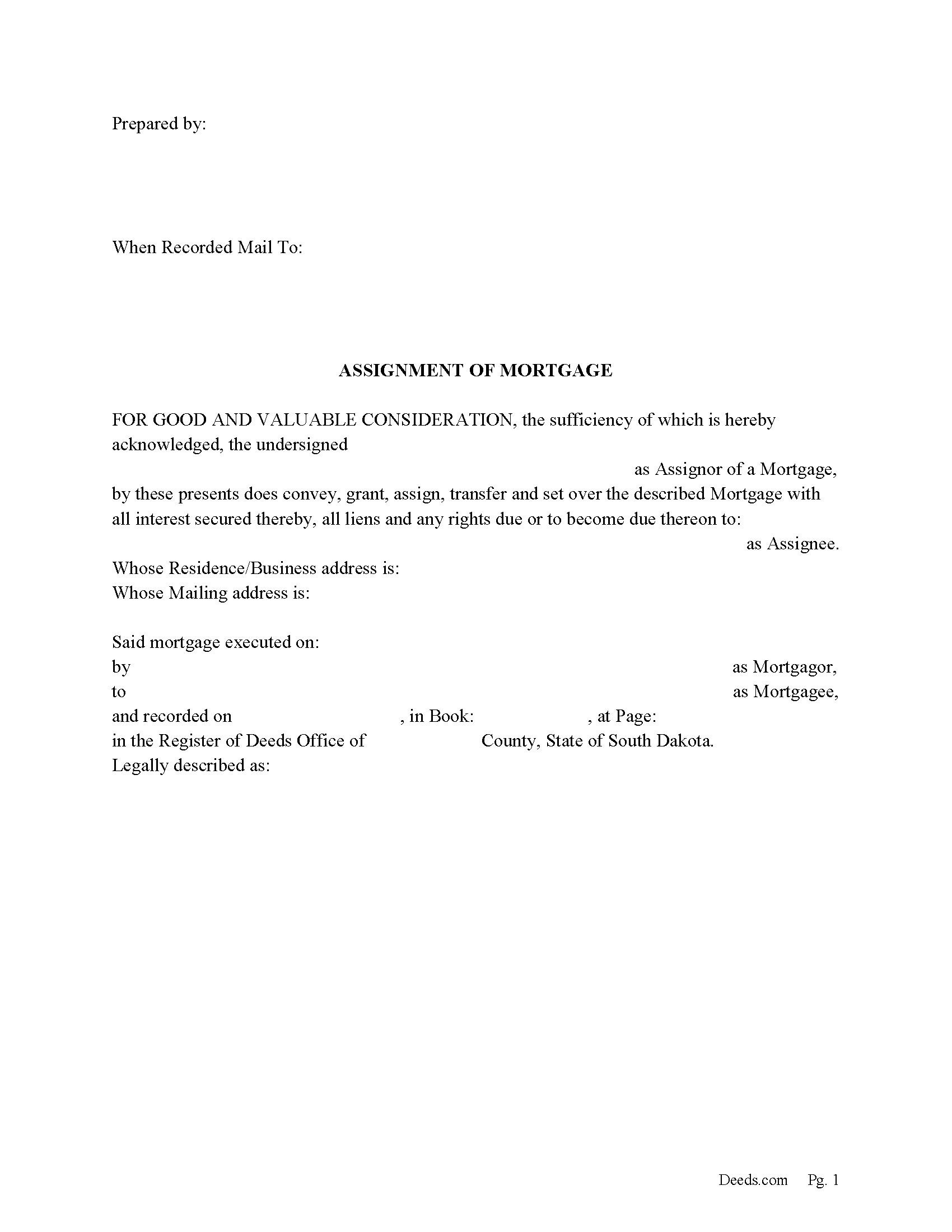
Use this form to assign a previously recorded mortgage to another person or entity.
Assignment of Mortgages-must include the following:
(1) the name of mortgagor
(2) the name of mortgagee
(3) the name of the assignee and its post office address
(4) the date, and book and page of recorded mortgage
(5) county and state
(6) the legal description
(7) execution and acknowledgment in front of a notary,
(8) corporate seal, especially if assignor is a bank, if no seal, state on the assignment "NO SEAL".
44-8-13 Assignment of mortgage on real property--Recording--Acknowledgment or proof--Contents--Record as notice. An assignment of a mortgage on real property may be recorded in like manner as a mortgage when it is acknowledged or proved according to the statutes relating to proof of instruments for record and contains the name of the mortgagor, the mortgagee, the assignee and the assignee's post-office address, the date of the mortgage, the date, county, state, book, and page of record of the mortgage and full description of the premises as described in the mortgage. This record serves as notice to all parties in interest or parties subsequently dealing with the property. No ... More Information about the South Dakota Assignment of Mortgage
Mineral Deed
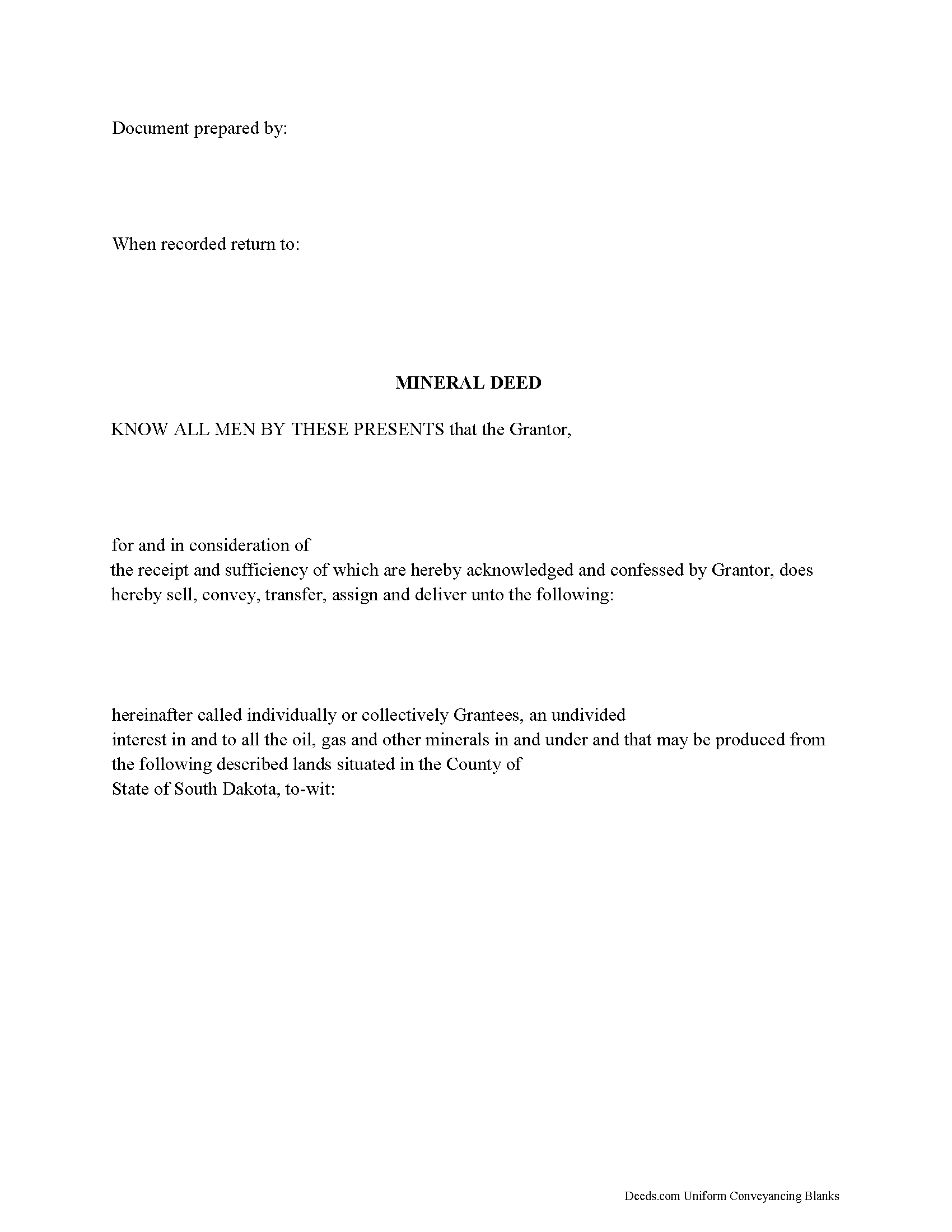
The General Mineral Deed in South Dakota transfers oil, gas, and mineral rights from the grantor to the grantee. THIS IS NOT A LEASE. There are no Exceptions or Reservations included.
The transfer includes the oil, gas and other minerals of every kind and nature. It also transfers any and all rights to receive royalties, overriding royalties, net profits interests or other payments out of or with respect to those oil, gas and other minerals. The Grantor can stipulate the percentage of Mineral Rights the Grantee will receive and is made subject to any rights existing under any valid and subsisting oil and gas lease or leases of record.
This general mineral deed gives the grantee the right to access, for the purpose of mining, drilling, exploring, operating and developing said lands for oil, gas, and other minerals, and storing handling, transporting and marketing of such.
In this document the Grantor Warrants and will defend said Title to Grantee. Use of this document has a permanent effect on your rights to the property, if you are not completely sure of what you are executing seek the advice of a legal professional.
(South Dakota MD Package includes form, guidelines, a... More Information about the South Dakota Mineral Deed
Mineral Quitclaim Deed
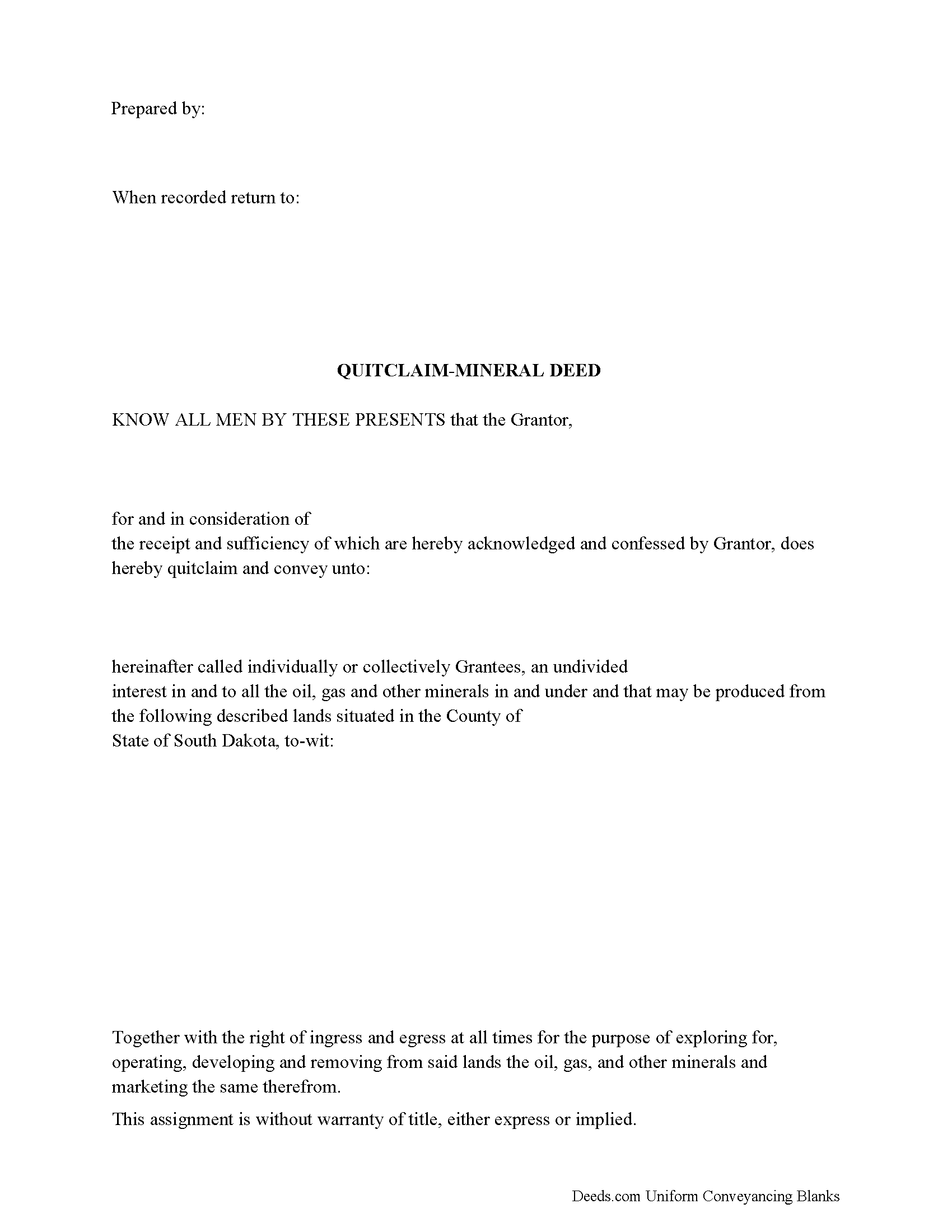
The General Mineral Deed in South Dakota Quitclaims oil, gas, and mineral rights from the grantor to the grantee. THIS IS NOT A LEASE. There are no Exceptions or Reservations included.
The transfer includes the oil, gas and other minerals of every kind and nature. The Grantor can stipulate the percentage of Mineral Rights the Grantee will receive.
This general mineral deed gives the grantee the right to access, for the purpose of mining, drilling, exploring, operating and developing said lands for oil, gas, and other minerals, and storing handling, transporting and marketing of such.
The seller, or grantor Quitclaims the mineral rights and does NOT accept responsibility to any discrepancy of title (This assignment is without warranty of title, either express or implied)
Uses: Mineral deeds with quitclaim are often used in situations where the grantor wants to quickly release any interest they might have in mineral rights, such as in settling estates, resolving disputes, clearing up uncertainties about ownership in a title's history or when mineral rights have previously been severed or fragmented from surface rights and cloud a title, making it difficult to transfer pro... More Information about the South Dakota Mineral Quitclaim Deed
Transfer on Death Deed
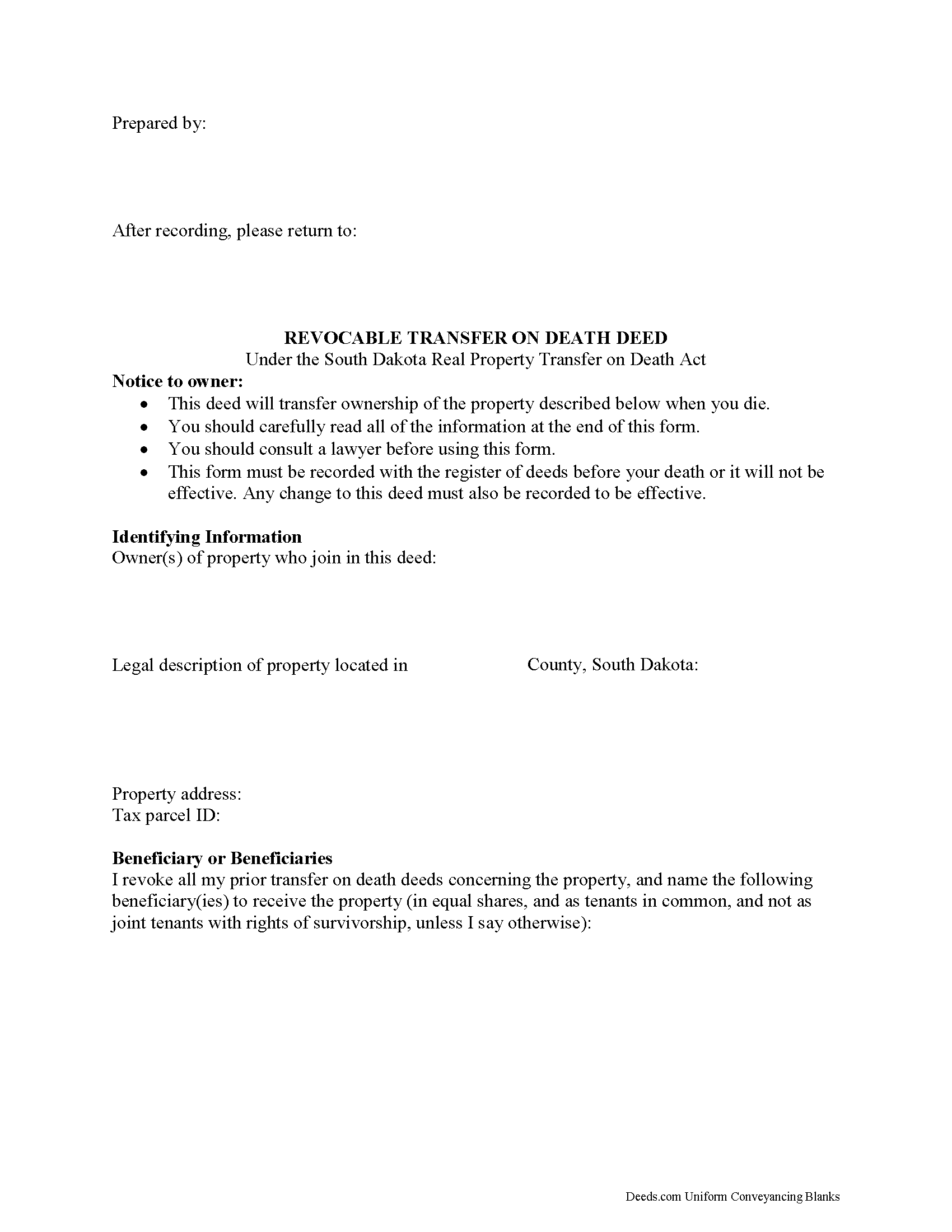
As of July 1, 2014, owners of real estate in South Dakota have access to a new estate planning tool: the transfer on death deed (TODD). Find the full text of the South Dakota Real Property Transfer on Death Act at 29A-6-401 of the South Dakota Codified Laws.
The statute is based on the Uniform Real Property Transfer on Death Act (URPTODA). In addition to South Dakota, a growing number of states are choosing to adopt the provisions of the URPTODA. The new law allows landowners to direct the distribution of what is often their most significant asset, their real estate, with a correctly executed and recorded transfer on death deed.
Standard conveyances such as warranty or quitclaim deeds, when executed, define permanent transfers of ownership. Deeds under URPTODA, however, are revocable (29A-6-405). Transferors under this law may sell, mortgage, rent, or otherwise use the property in any way they wish; TODDs only contain a potential future interest (29A-6-414(1)). They provide owners with the flexibility to accommodate changing circumstances by modifying or even cancelling the recorded transfer. This is possible because TODD beneficiaries have absolutely no rights to or interes... More Information about the South Dakota Transfer on Death Deed
Transfer on Death Revocation
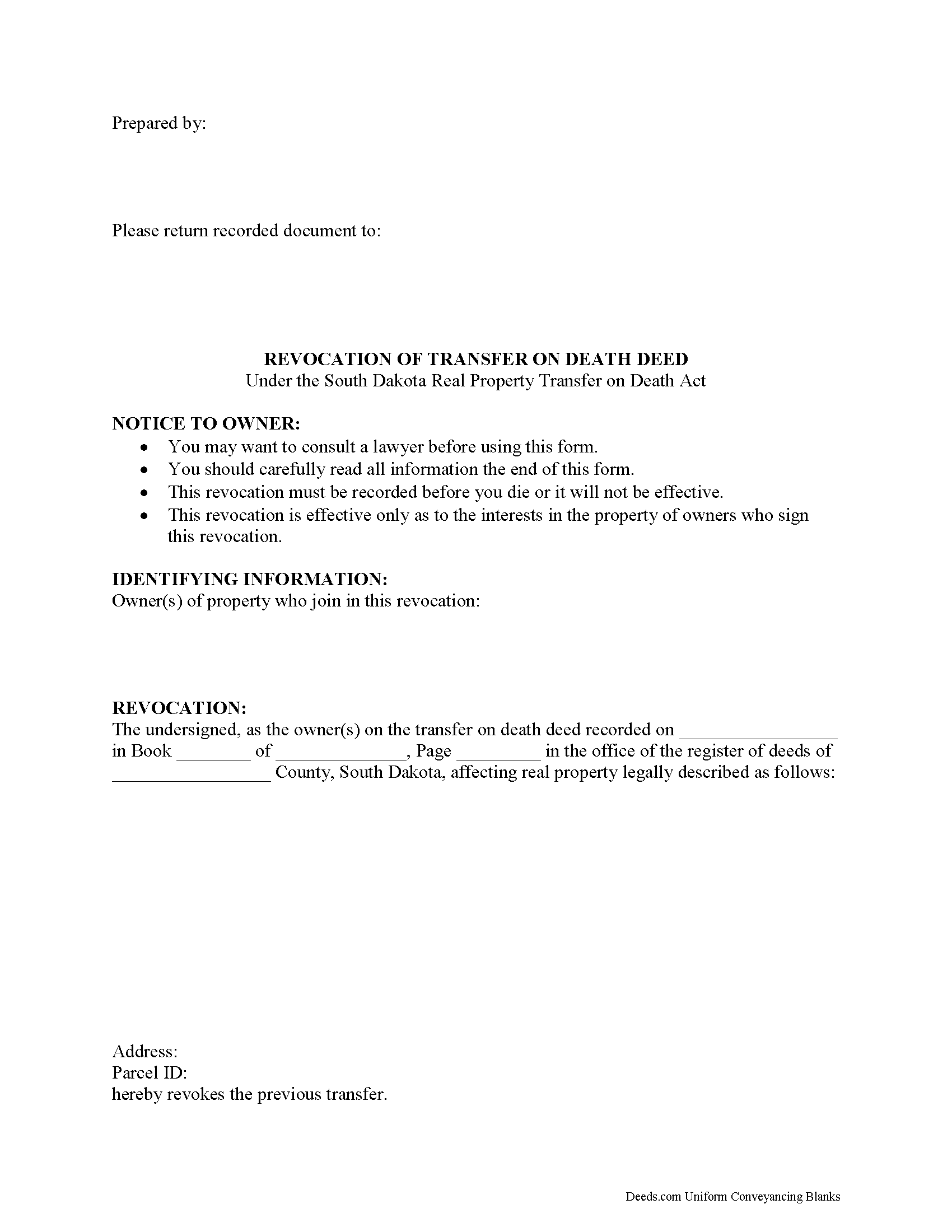
Revoking a Transfer on Death Deed in South Dakota
The South Dakota Real Property Transfer on Death Act (SDCL 29A-6-401 et seq) went into effect on July 1, 2014. It offers owners of real estate in South Dakota an option for distributing their land after death by recording a transfer on death deed (TODD). They retain absolute control over and use of the land during their lives. The transferors may even modify or revoke the future transfer without penalty, and there is no need to update their wills or subject the property to probate.
This revocability is one of the most useful features about transfer on death deeds (TODDs) under the new law is (29A-6-405). It states that a TODD "is revocable even if the deed or another instrument contains a contrary provision." This is possible for two main reasons:
<ul><li>there is no obligation for consideration from or notice to any named beneficiaries (29A-6-409); and </li>
<li>until the owner's death, the beneficiaries have no actual, or present, interest in the property (29A-6-414).</li></ul>
Find the rules for revoking a previously recorded TODD at 29A-6-410. Subject to 29A-6-411, there are three primary ways to revoke or change the ... More Information about the South Dakota Transfer on Death Revocation
Transfer on Death Affidavit
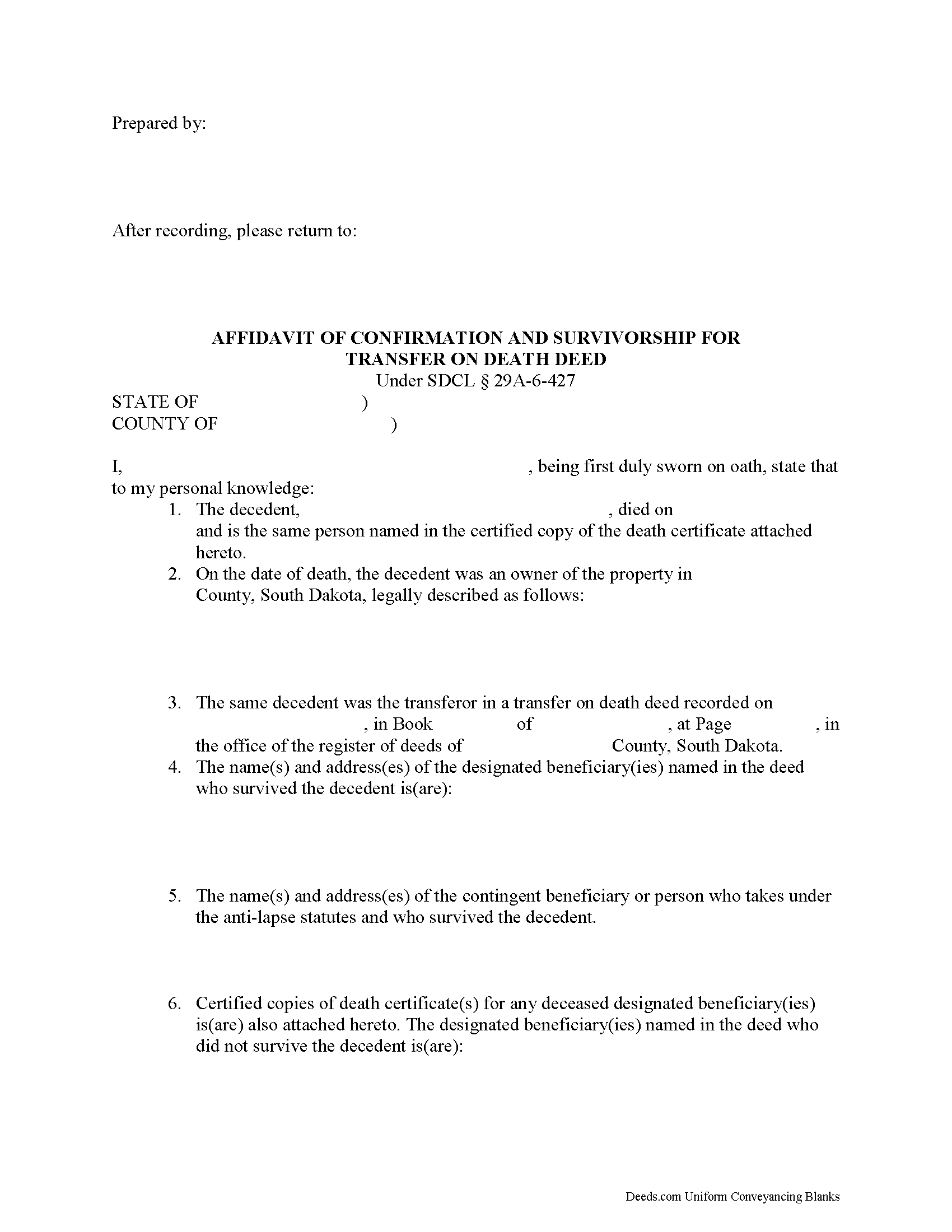
Completing a Transfer on Death Using South Dakota's Affidavit of Confirmation
The South Dakota Real Property Transfer on Death Act can be reviewed in its entirety at SDCL 29A-6-401 et seq. By applying this law, owners of real estate located in South Dakota may designate one or more beneficiaries to gain title to their land after the transferor's death, without a will or the need for probate distribution. A lawfully executed and recorded transfer on death deed (TODD) allows owners to retain absolute possession of and control over their property. The TODDs are revocable, so the owners may also modify or even cancel the potential future interest without penalty.
The act contains the specific requirements for conveying ownership after the owner's death (29A-6-427). According to this section, the beneficiary must complete an affidavit of confirmation and submit it for recording to the register of deeds in the county where the property is located. The affidavit of confirmation must be verified before a person authorized to administer oaths and must be accompanied by a certified copy of the death certificate for the deceased owner and for each designated beneficiary who died while... More Information about the South Dakota Transfer on Death Affidavit
Affidavit of Deceased Joint Tenant
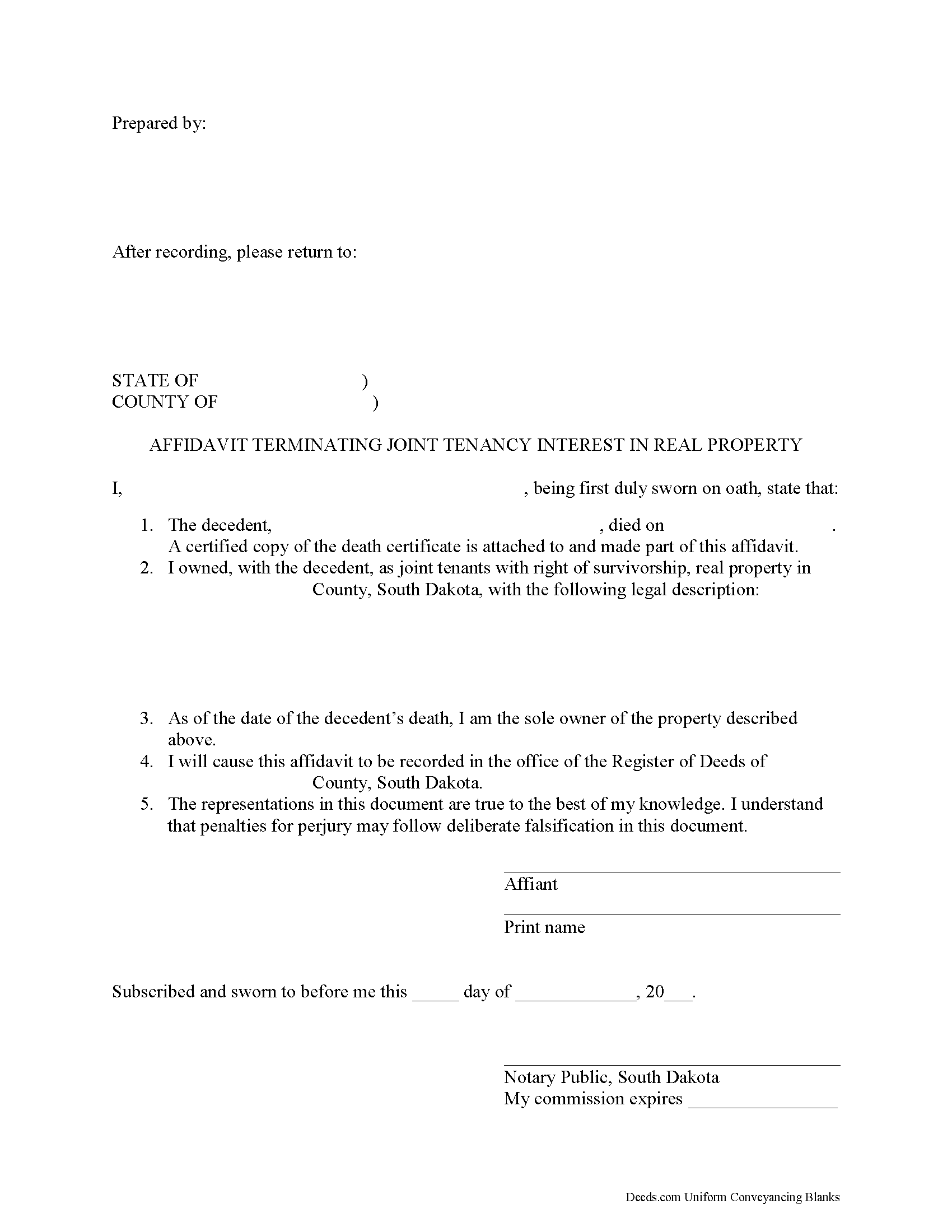
Clearing the Title on South Dakota Real Estate after a Joint Tenant Dies
In South Dakota, land owned by two or more people can be held as a tenancy in common, a partnership, or a joint tenancy (SDCL 43-2-11).
Joint tenancy, as defined at 43-2-12, is a property interest "owned by several persons in equal shares, by a title created by a single will or transfer, when expressly declared in the will or transfer to be a joint tenancy, or when granted or devised to personal representatives or trustees as joint tenants." South Dakota's joint tenancy includes the right of survivorship, meaning that if one of the co-owners dies, that person's share is distributed equally among the remaining owners. This distribution is identified as a nonprobate transfer under 29A-2-205(ii).
Nonprobate transfers are not included in the deceased owner's estate; instead, they cause the property to descend to the survivors as a function of law. Still, it makes sense, especially with real estate titles, to formalize and update the changed status. One way to accomplish this is by executing and recording an affidavit stating the relevant facts, attach a certified copy of the decedent's death certific... More Information about the South Dakota Affidavit of Deceased Joint Tenant
Personal Representative Deed of Distribution
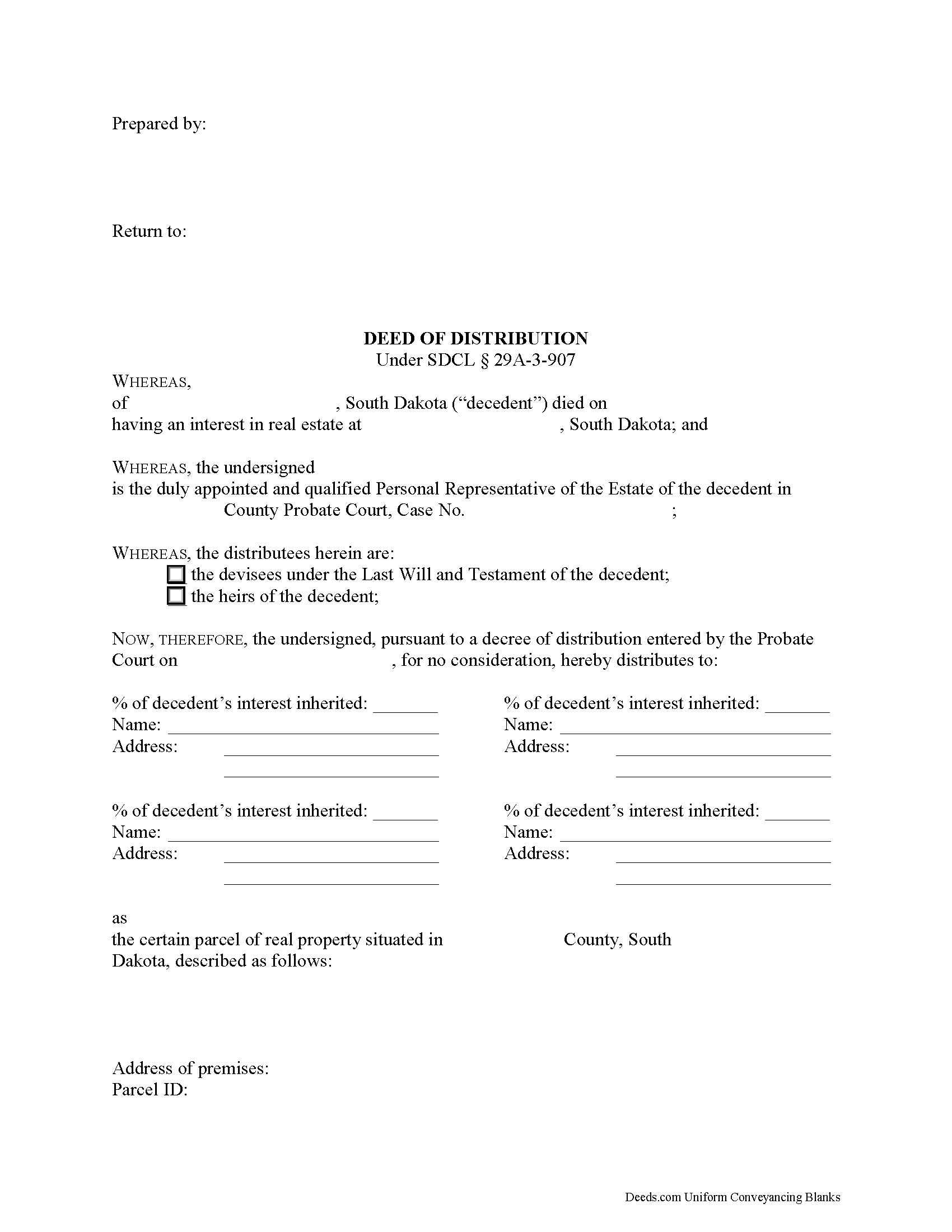
In South Dakota, title to a decedent's real property devolves upon death to the decedent's devisees (for testate estates) and heirs (for intestate estates) (SDCL 29A-3-101). Though the title transfers by operation of law, the estate is still subject to administration in probate. Probate is the legal process of settling the decedent's estate and distributing assets to those entitled to receive them.
In probate proceedings, governed by Title 29A of the South Dakota Codified Laws, a personal representative (PR) is appointed to the estate by the probate court to act as the estate's fiduciary. After paying valid claims on the estate, applicable taxes, and expenses of administration, the PR is responsible for making distributions of property. Any part of the estate not disposed of by will is transferred by South Dakota's laws of intestate succession, located at SDCL 29A-2.
The PR executes a deed of distribution "as evidence of the distributee's title" (29A-3-907). A recorded deed of distribution is "conclusive evidence that the distributee has succeeded to the interest of the decedent...as against all persons interested in the estate," though the PR may recover the assets in case ... More Information about the South Dakota Personal Representative Deed of Distribution
Personal Representative Deed of Sale
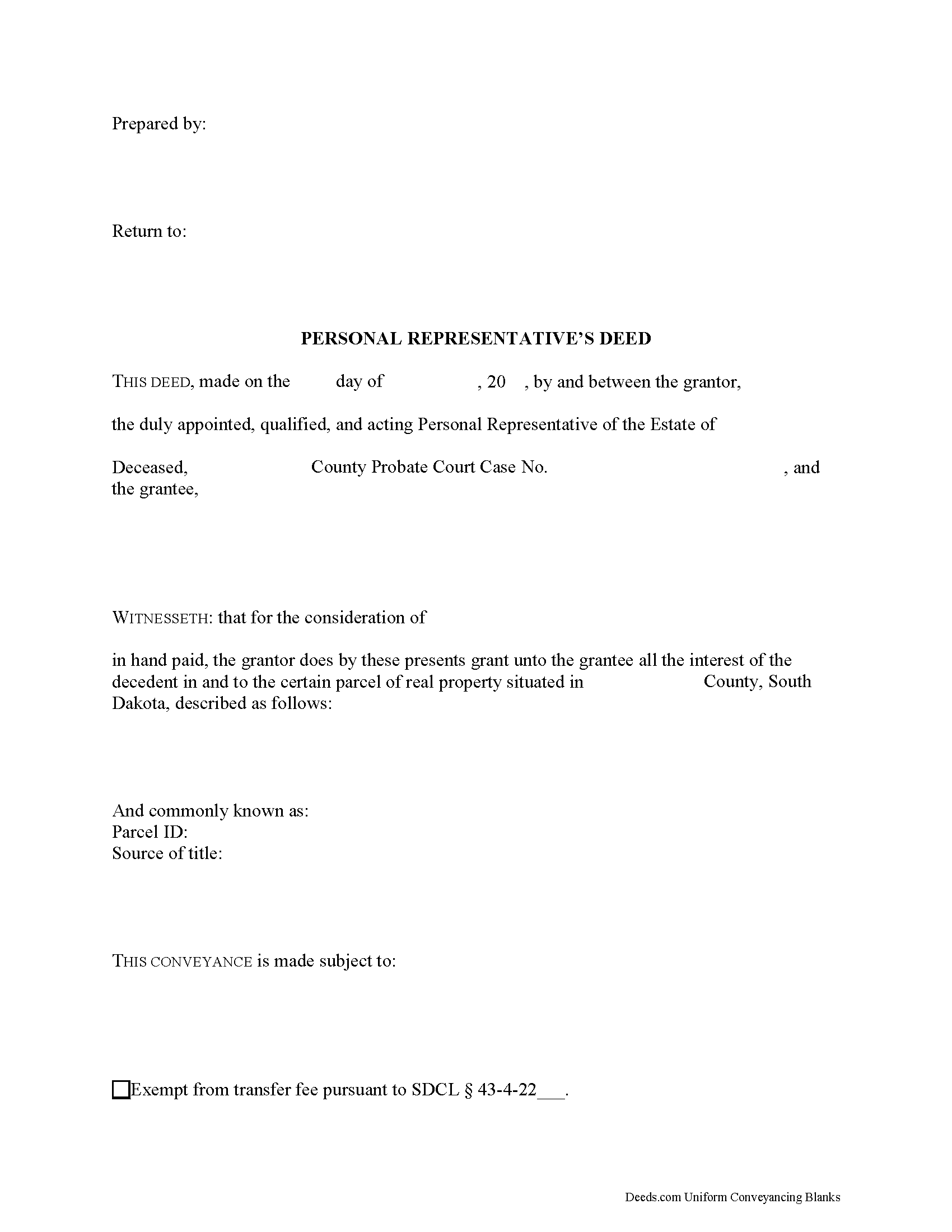
In South Dakota, title to a decedent's real property devolves upon death to the decedent's devisees (for testate estates) and heirs (for intestate estates) (SDCL 29A-3-101). Though title transfers by operation of law, the estate is still subject to administration in probate. Probate is the legal process of settling the decedent's estate and distributing assets to those entitled to receive them.
In probate proceedings, governed by Title 29A of the South Dakota Codified Laws, a personal representative is appointed to the estate by the probate court to act as the estate's fiduciary.
Once authorized by the probate court, a personal representative (PR) of an estate "has the same power over the title to property of the estate that an absolute owner would have, in trust however, for the benefit of the creditors and others interested in the estate," which "may be exercised without notice, hearing, or order of court." (29A-3-711).
During estate administration, the PR may be required to sell realty to make payment of claims on the estate, to cover expenses of administration, or to liquidate the estate to facilitate easier distribution. SDCL 29A-3-715 entitles the PR to sell real pr... More Information about the South Dakota Personal Representative Deed of Sale
Trustee Deed
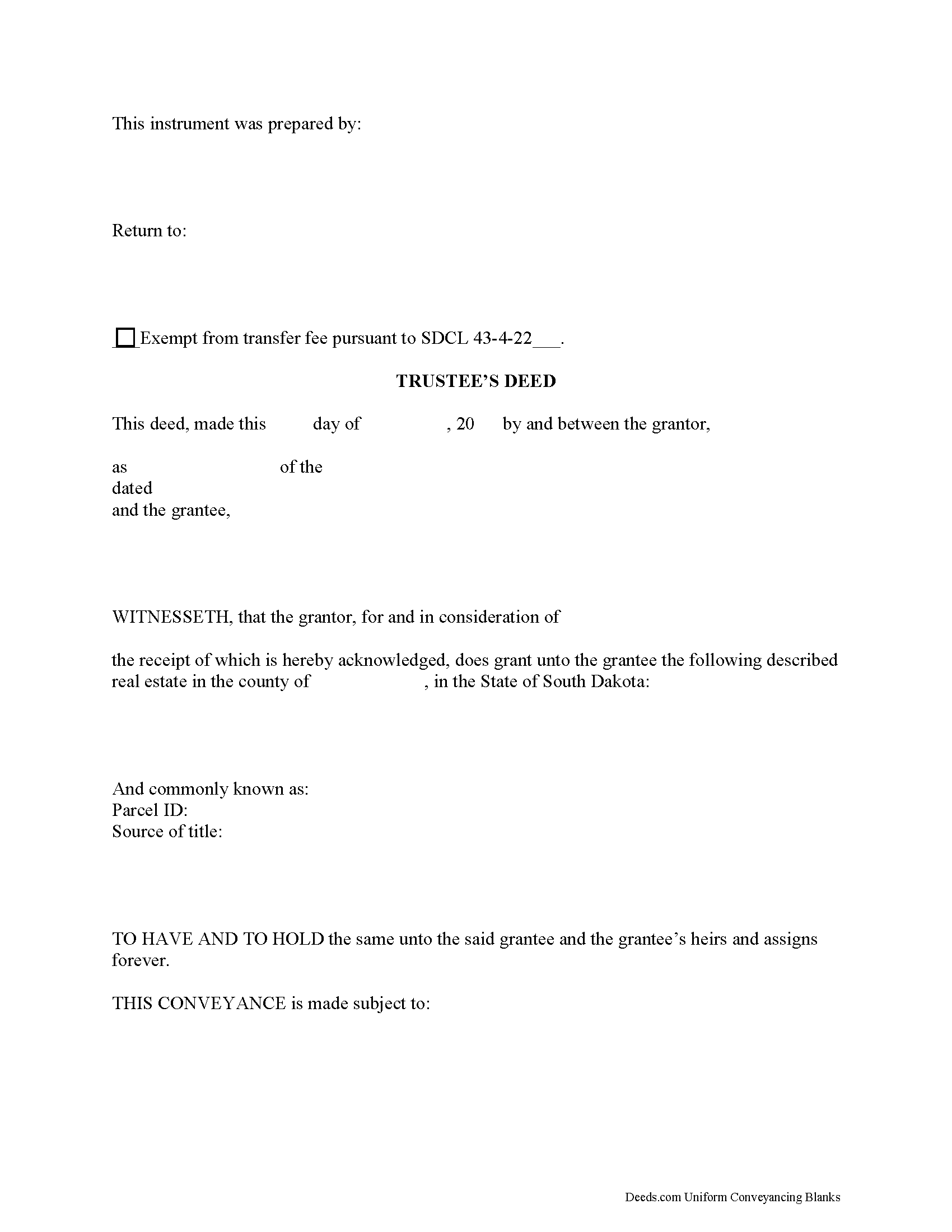
Transferring Real Property by Trust in South Dakota
In a trust arrangement, a settlor transfers property (which may include real estate) to another person (called the trustee) for the benefit of another (called the beneficiary). Trusts that take effect during the settlor's lifetime are called living (inter vivos) trusts, and trusts that take effect upon the settlor's (testator's) death through the provisions of a will are called testamentary trusts.
In a living trust, a settlor may serve in all three capacities, as long as he is not the sole beneficiary. Living trusts are estate planning tools that take effect during a settlors' lifetime and allow them to determine how their assets will be managed upon death.
In South Dakota, trusts relating to real property must be created by a written instrument signed by the trustee (SDCL 43-10-4). The trust instrument establishes the trust's provisions, determines how the trust will be managed, designates the trustee and the trustee's powers, and identifies the trust beneficiary. Trust instruments are generally unrecorded in order to maintain the privacy of the settlor's estate plan. Transfers of real property to into trust can either... More Information about the South Dakota Trustee Deed
Certificate of Trust
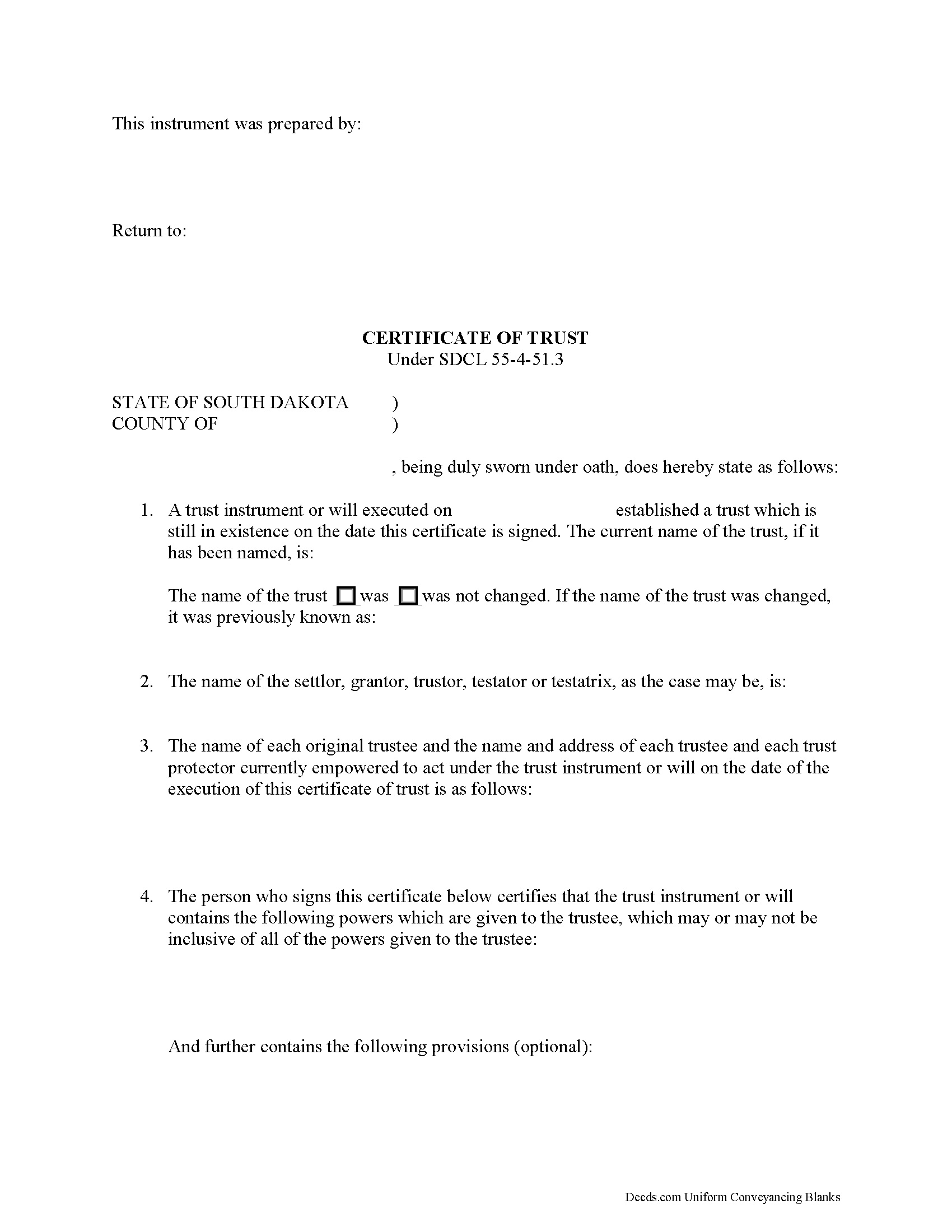
Codified at SDCL 55-4-51.3 as part of the Uniform Trusts Act, the certificate of trust "in support of a real property transaction" is recorded in the South Dakota county where the subject property is located and "serves to document the existence of the trust...and other matters...as though the full trust instrument had been recorded" (SDCL 55-4-51.3, 55-4-51.1).
In a trust relationship, a settlor transfers property to another person (trustee), who holds it for the benefit of a third (beneficiary). In the course of their fiduciary duties, trustees may present a certificate to parties who are not beneficiaries of the trust in lieu of providing the entire trust instrument. The trust instrument, executed by the settlor, establishes the trust and sets forth directions for its administration, including designating the trustee, the trustee's powers, and identifying a trust beneficiary. The certificate of trust allows the settlor's estate plan to remain off-record by providing only the information about the trust relevant to the transaction at hand.
The document names the trust, its settlor, and each trustee empowered to act for the trust. Aside from certifying the existence of the ... More Information about the South Dakota Certificate of Trust
Disclaimer of Interest
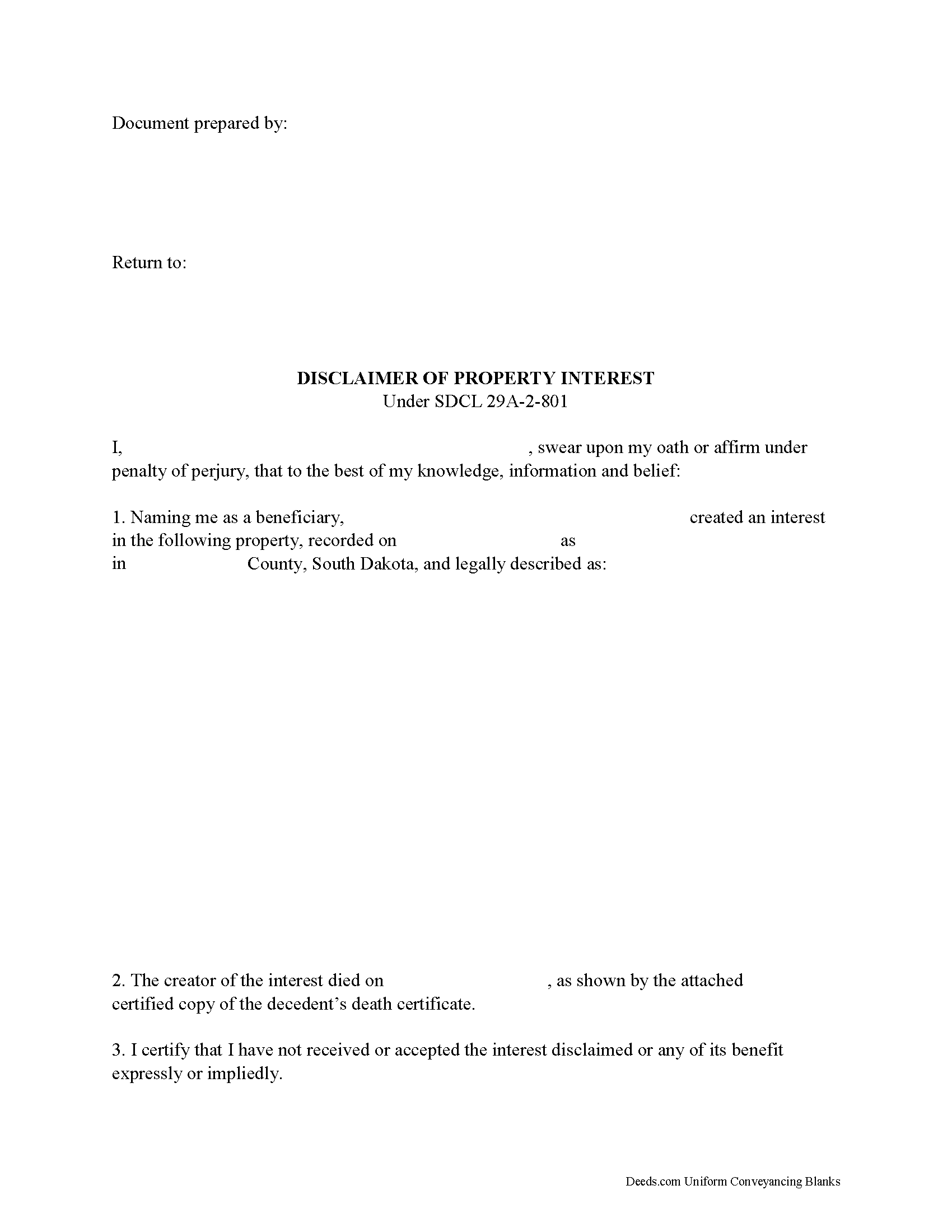
Under the South Dakota Codified Laws, the beneficiary of an interest in property may disclaim the gift, either in part or in full (SDCL 29A-2-801). Note that the option to disclaim is only available to beneficiaries who have not acted in any way to indicate acceptance or ownership of the interest (29A-2-801).
The disclaimer must be in writing and be filed within nine months of the transfer (e.g., the death of the creator of the interest) with the clerk of the court in which the estate is or was pending (29A-2-801 (b)). If real property is involved, record a copy of the document in the office of the Register of Deeds of the county in which the property is located in order to avoid any ambiguity regarding the chain of title.
A disclaimer is irrevocable and binding for the disclaimant and his or her creditors, so be sure to consult an attorney when in doubt about the drawbacks and benefits. If the interest arises out of jointly-owned property, seek legal advice as well.
(South Dakota DOI Package includes form, guidelines, and completed example)... More Information about the South Dakota Disclaimer of Interest